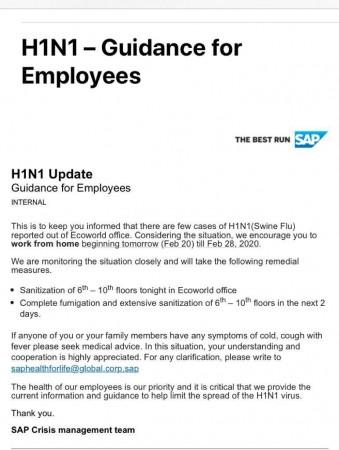SAP internal memo had gone viral online with the mention H1N1 swine flu cases in Bengaluru. In the memo, the software company's crisis management team alerted its employees about a few cases of H1N1 reported out of Ecoworld office in Bengaluru. As a precaution towards this, the company has asked its employees to work from home from February 20 till 28, 2020.
The memo also informed about the sanitation process to be undertaken at the 6th - 10th floors of SAP's offices in Ecoworld Business Park. International Business Times reached out to SAP India for clarification on the memo and the company exclusively confirmed to us that two of its employees from Bengaluru had been tested positive for H1N1.
Here's the SAP India memo regarding H1N1 in Bengaluru.

"Two SAP India employees based in Bangalore (RMZ Ecoworld office) have tested positive for the H1N1 virus. Detailed contact tracing that the infected colleagues may have come into contact with is underway. The health of our employees and their families is of utmost priority, as a precautionary measure, all the SAP Offices across Bangalore, Gurgaon and Mumbai have been closed for extensive sanitization, and all SAP employees based in these locations have been asked to work from home till further notice," SAP India said in an exclusive statement to International Business Times, India.
We also reached out to RMZ Ecoworld, but they hadn't received any official reports on the H1N1 cases in the business park.
H1N1 swine flu: What you must know
Swine flu is any strain of influenza family of virus endemic in pigs. In August 2010, the WHO declared swine flu pandemic officially over. In India, more than 30,000 people were tested positive and the virus caused over 1,800 deaths as of March 2015. But there have been swine flu reports as recent as last year.

Swine flu, like any seasonal flu, can spread through the air when someone coughs or sneezes. Swine flu symptoms are cough, fever, sore throat, running nose, body ache, headache, chills and fatigue.
To prevent getting infected from the virus, it is best to get a flu vaccine every year. Despite the H1N1's origin, it does not infect by consuming bacon, ham or other pork products. But people are advised to keep sanitizers handy and use it frequently. Wear masks to prevent catching the virus through air.














